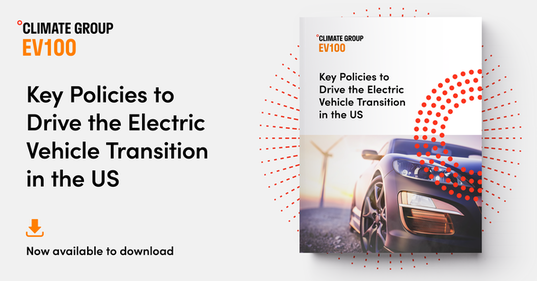Transportation electrification is on the rise around the world.
Read our updated paper on Key Policies to Drive the Electric Vehicle Transition in the US. This document was updated in January 2022 with new signatories.
An ambitious zero-emission transportation strategy would allow the US to achieve significant emissions reductions, clean air and healthy communities, economic prosperity and job creation and international competitiveness.
The transportation sector is the largest source of GHG emissions in the US, accounting for 28% of total emissions. As such, transportation electrification offers the US a prime opportunity to reclaim its place as a global climate leader while providing major benefits for its citizens and the long-term health of its economy.
When released, the following EV100 members supported the policies presented in this newly released policy paper: Biogen, Clif Bar, Danfoss, DHL, Genentech, HP, Ingka Group, Lime, Lyft, Novartis, Pacific Gas and Electric Company, Siemens, Taxelco, and VMware. Additional signatories added in September 2021 include ABB, GSK, National Grid and Zurich. EV100, a global initiative led by the Climate Group, delivers a meaningful reduction in global transportation emissions by bringing together companies to accelerate the transition to electric vehicles (EVs).
While corporate leadership can play a crucial role in driving the market transition to clean transportation, supportive policy frameworks are needed to enable businesses to achieve their commitments. This paper outlines key policy areas that will be critical to advancing the transition to zero-emission transportation in the US.
As of March 2021, EV100 members in the US have already deployed over 46,000 vehicles and 246 charging locations, with 2,001 charging points already installed. These figures clearly demonstrate businesses’ ability and willingness to lead. However, the progress they and other companies will be able to make significantly depends on the market and policy contexts they operate in. The business community needs clear signals that government will support them and create the framework conditions that further the EV industry and reduce transportation emissions.
Key Policy Areas:
- Set ambitious targets backed by robust policy frameworks.
- Stimulate supply of zero-emission vehicles.
- Drive demand for EVs.
- Build out infrastructure to ensure easy EV charging for all.
Key Policies to Drive the Electric Vehicle Transition in the US (Updated January 2022).pdf
Size: 1.96 MB
Date added: 24/01/22
